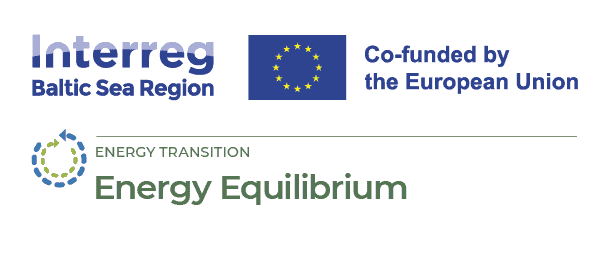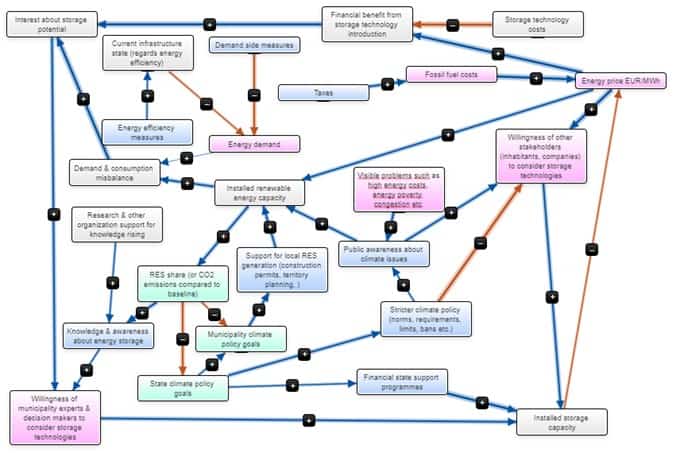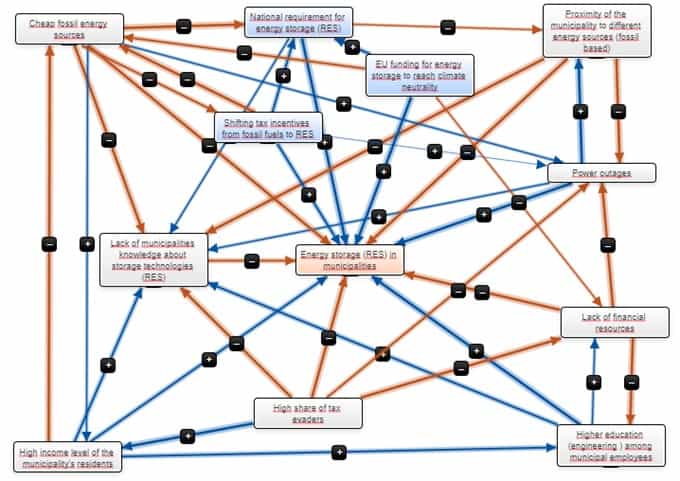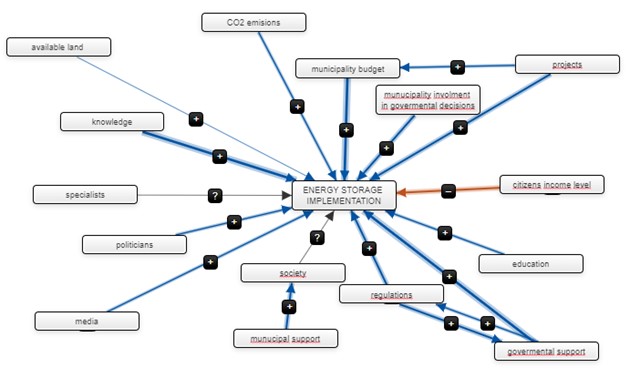
Exploring Energy Storage Perspectives: Insights from Different Stakeholders
27 July 2023
We are thrilled to present the results of two innovative and interactive workshops implemented in the scope of the Energy Equilibrium project that took place in Riga on May 19, 2023 and in Hamburg on May 25, 2023 with the aim of obtaining the information from participants in the form of mental or cognitive maps to gain knowledge on how participants individually and as the group perceive the key opportunities and barriers in energy storage implementation.
The workshops accommodated a diverse group of participants, some possessing profound knowledge and expertise in energy systems, while others had limited understanding in this field. Workshop incorporated different groups of stakeholders such as research organizations, municipality representatives, energy clusters and consultancies, local infrastructure providers and sectoral agencies – and the main focus of the activity was to gain insight from involved parties about technical, economic, social and environmental aspects that influence the development and implementation of energy storage technologies in municipalities.
During the workshops, the participants were initially introduced to concepts such as mental models and systems thinking, along with their significance in the context of the project. Afterward, the participants were presented with the following questions:
- What factors affect energy storage implementation in municipalities?
- What social and environmental factors influence energy storage implementation in municipalities?
- What policies could governments and local public authorities implement to facilitate the implementation of energy storage technologies in municipalities?
And there were three tasks each participant had to carry out after each question:
- Come up with factors (both tangible and intangible) that affects the system under the study;
- Describe the connections between factors by connecting them with arrows;
- Decide on what polarity and strength each of the connections have.
The participants completed their developed mental models, which were then submitted on the webpage mentalmodeler.com and shared with the workshop hosts.
After receiving the individual models, all individual models were analyzed and carefully combined to obtain general view. The results revealed that 458 factors were mentioned in the received mental model maps, with 266 of them being unique. All individual factors were then placed within 21 defined categories.
Categories of factors:
- Energy storage implementation
- Knowledge, familiarity & awareness
- Energy demand
- Energy infrastructure (production, transmission, distribution)
- Energy price
- Technology costs
- Financial benefits
- Willingness and readiness to adapt
- Climate and energy targets
- Policies – taxes
- Policies – support
- Policies – knowledge & awareness raising
- Energy surplus
- Energy dependence and security
- Funding availability (without support)
- Occurrence of extreme circumstances
- Citizen’s opinion
- Technology solutions
- Environmental impact
- Territory availability
- Other
Nearly all the respondents emphasized the significance of energy storage implementation and support policies as essential factors for municipalities. On the other hand, tax policies, energy dependence and security, and technology solutions were mentioned only by a small number of respondents.
Most of the energy experts and participants from the Hamburg event highlighted the importance of knowledge, familiarity, and awareness regarding energy storage implementation. However, this aspect was considerably less mentioned by university employees. Similarly, the category related to the willingness and readiness to adopt storage technologies followed the same trend, with energy experts and Hamburg event participants considering it a crucial factor, while university employees mentioned it less frequently.
Interestingly, none of the university employees mentioned territory availability and energy dependence and security as influential factors for energy storage implementation. Likewise, tax policies were not mentioned by any of the Hamburg workshop participants.
Energy experts were the only group that incorporated elements from all the categories into their mental models. However, territory availability was mentioned less frequently among the energy experts’ responses.
This article was prepared by Laura Kristiāna Vičmane








